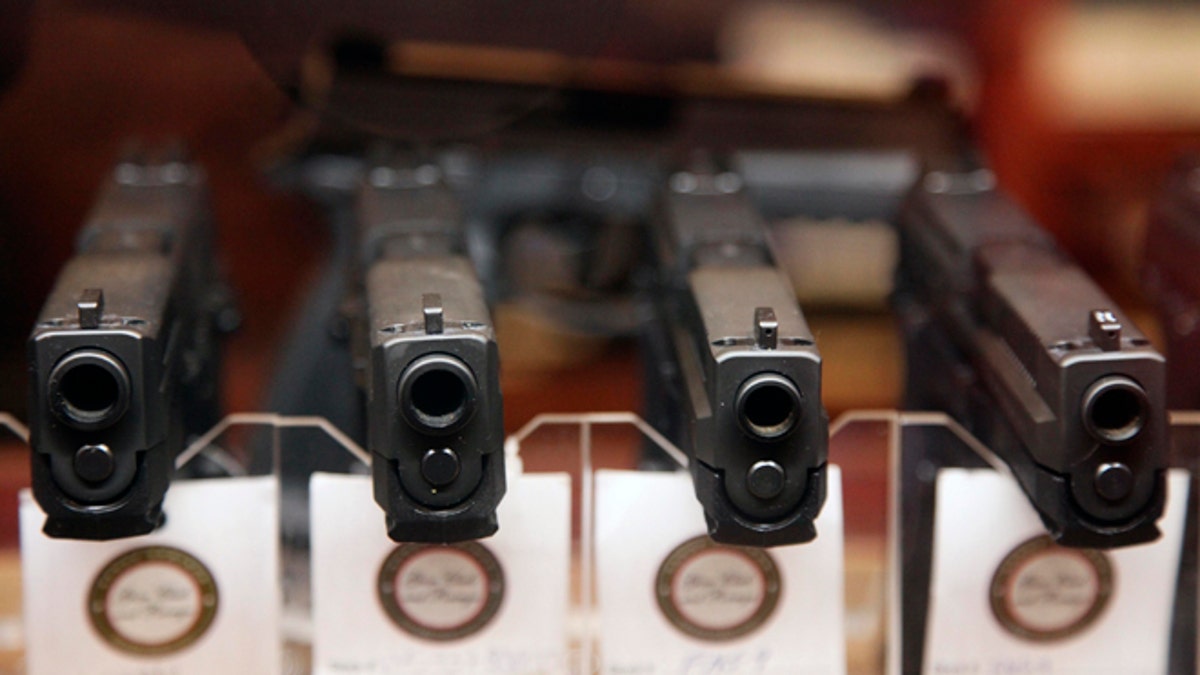
Jan. 4, 2013: Handguns are displayed in the sales area of Sandy Springs Gun Club and Range, in Sandy Springs, Ga. (AP)
Firearms and ammunition manufacturers facing new gun control restrictions in their home states are receiving invitations to flee critics and move to states that have more favorable conditions for gun sales.
Colorado Gov. John Hickenlooper earlier this month signed bills that require background checks for private and online gun sales and ban ammunition magazines that hold more than 15 rounds.
Magpul Industries, which manufactures firearms accessories and ammunition magazines, said on its Facebook page that it would have "no choice" but to leave if the magazine bill was signed, causing an opening for states eager to prove they're more gun-friendly.
Grassroots Facebook pages have popped up - some, before the Colorado bills were even signed - encouraging Magpul to settle in places like Alabama, West Virginia or Texas. Alaska state Rep. Tammie Wilson's staff created a Facebook page, too, called "Magpul Industries - Alaska Wants You."
In Texas, Gov. Rick Perry has made overtures to Magpul, which announced on its Facebook page following the signing of the magazine bill that the moving process has begun. A new location has yet to be determined by the company.
In New Hampshire, a group of conservative Republicans sent letters wooing gun companies. Politicians in Virginia and West Virginia have said they would welcome Beretta if it chose to leave Maryland. Alaska House Speaker Mike Chenault, in a letter to the head of Magpul Industries last week, said he read "with shock and disdain" reports of new gun laws in Colorado, the home of the firearms accessory and magazine manufacturer. "Though many feel the actions taken by your state government were appropriate," he wrote, "we in Alaska do not."
A Hickenlooper spokesman declined comment Friday on efforts to woo Magpul. Hickenlooper told reporters after he signed the bills that state officials tried to ease Magpul's concerns and craft the legislation so they could continue manufacturing in Colorado. He said "nothing in any of these laws" prohibits Magpul from continuing to operate in Colorado. "But that's their decision," he said.
When the debate over gun laws reignited after the mass shooting in Newtown, Conn., in December, critics of proposals to toughen state laws cautioned that gun manufacturers could move and take local jobs with them. And indeed, now lawmakers and residents in a few states are using restrictions on guns recently passed and proposed elsewhere as an opportunity to attract affected businesses.
Whether their campaigns would work remains to be seen, and it may be beside the point.
Jeremy McGowan, of Buckhannon, W.Va., said he started a Facebook page, "Bring Magpul to West Virginia," with "very little hope" of actually attracting the company. He said he wanted at least to draw attention to the issues raised in Colorado and try to prevent something similar from happening in West Virginia.
"I don't think we are a minority at all," he said. "I think a lot of us feel we have been pushed in a corner."
He's joined in the movement by a group of self-described constitutional conservatives in the New Hampshire legislature, the House Republican Alliance, who are pitching the state as a haven for gun companies.
The group recently sent letters to Beretta USA Corp. in Maryland and Colt Manufacturing Co. in Connecticut. Both companies have voiced frustration with proposals in their states that aim to tighten background checks as well as ban assault weapons and high capacity magazines.
But the group has done little beyond write letters, leaving open the question of whether its pleas will bring any new business to the state. The group has not enlisted the help of the state agency that would traditionally handle outreach to companies elsewhere. Rep. Al Baldasaro, a Londonderry Republican, said that's because group members see it as an extension of Democratic Gov. Maggie Hassan, whom they have also not reached out to. And neither gun maker has written them back.
Baldasaro rejected the notion that courting gun companies could be seen as a cynical attempt to capitalize on the gun debate.
"This is about bringing jobs to New Hampshire," he said Friday. "It has nothing to do with what happened in Connecticut or anywhere else."
His group noted that New Hampshire is already home to 80 firearm component manufacturers including Sig Sauer Inc., Sturm, Ruger & Co. Inc., Heckler & Koch USA, and its letters cited laws preventing restrictions on firearms manufacturing.
Such restrictions drew the ire of a Beretta executive at a recent hearing in Maryland, where an assault weapons ban has been proposed. The bill spurns Beretta's longstanding commitment to the state, Jeff Reh, a member of the company's board of directors, told lawmakers.
Those types of complaints from firearms companies leave lawmakers in their home states pulled between responding to the hunger for more restrictive gun laws and wanting to keep their constituents employed. Maryland's Senate president pointed to work lawmakers have done this year to try to help Beretta while also keeping important provisions of the bill intact.
"We've allowed them to manufacture," said Thomas V. Mike Miller, who represents the district where the factory is located in Accokeek. "We've allowed them to sell, and we've cut back on their paperwork."
Much more than that awaits Beretta and its employees in New Hampshire, the Republicans there promised. The state does not have an income tax or sales tax, and it's known for gun advocacy.
"It would be a win-win for any gun company to move here. We're the 'live free or die' state," Baldasaro said, citing New Hampshire's motto.
The Associated Press contributed to this report.




